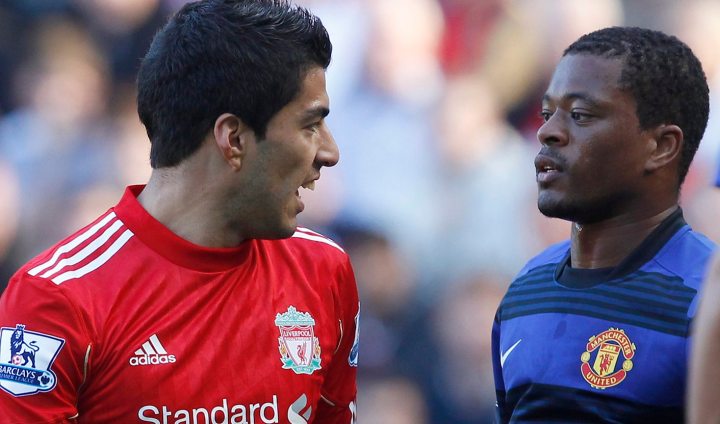Sport
Kick It Out launching app to report racism

Kick It Out, still operating on a shoestring budget despite the Premier League’s massive income, is planning to launch a smartphone app to report racism in the stands and changerooms. It’s another hammer-and-tongs move, sure, but the FA still seems apathetic regarding any actual real change. By ANT SIMS.
Football continues to move towards the future. With goal line technology and huge money business, the game is becoming bigger than anyone could ever have imagined. The one area of regression, however, remains racism – which still seems prevalent amongst fans and players alike.
Kick It Out is now looking to change all that. They are planning to launch smartphone apps next season that will allow players and fans anonymously to report abuse in the stands or dressing rooms. The aim is to change the thinking that racism in changerooms should go unchallenged, and help fans who want to change, but possibly feel frustrated in seas of crowds where racism is basically second-nature.
There will be two apps, one for players and one for spectators, and the aim is to make it easier and quicker to report abuse. Kick It Out hopes that the apps will help paint a picture of the scale of the problem, eventually leading to more sanctions and criminal convictions.
There are currently hotlines to report bad behaviour, but Kick It Out hopes the app will allow fans easily to report racist, homophobic or anti-Semitic abuse right as it happens.
Kick It Out’s budget remains tight, and a lot of the development has been made possible through goodwill. While the Premier League continues to coin it through lucrative broadcast deals, many of those who are trying to make a difference remain, unfortunately, financially restricted.
Players have previously demanded that Kick It Out’s role become more proactive, but with a permanent staff of six and just £125,000 a year from the Football Association, the Premier League and the Professional Footballers’ Association, things are still tough.
Funding is always being negotiated, but even UK sports minister Hugh Robertson admits that with the way things stand, Kick It Out won’t be able to increase its profile.
“The level of funding they have at the moment makes it almost inevitable that black players operating at the cutting edge of this feel that it is not enough,” Robertson said in an interview with the Guardian.
The Sports Minister also believes that not nearly enough is being done, despite slogan t-shirts and billboards superficially saying all the right things. Still, a protest from prominent players of colour last year, where they all refused to wear Kick It Out t-shirts while warming up, did call some attention to their cause.
“From my point of view, not enough has been done yet. You have had the plan from the FA but it hasn’t gone far enough. It seems there are no deliverables, there are no measurables. It’s just nice words. Not wearing the T-shirt wasn’t a specific attack on Kick It Out,” Robertson said.
“I don’t think the authorities were taking it seriously enough and are still not taking it seriously enough. We are moving in the right direction but we’re still behind time. The PFA are doing some great work with their equalities department and we’re now discussing coaching fair play, a variation on the Rooney rule [employed by the NFL to promote coaches from ethnic minority backgrounds].”
“But what came back to me was that players felt they didn’t have the outlet to make their point and this was their opportunity. So when the explanation did come, people like myself had to acknowledge they’d made a very good point. It brought a lot of attention to what was happening and almost forced the hands of the PFA, the FA, of Kick It Out and subsequently the government to take a real forensic look at how they were addressing the issue.”
Northampton Town defender and PFA chairman, Clarke Carlisle, believes that hitting out by not wearing t-shirts wasn’t quite right, but again admitted that it was a platform for players who might be feeling marginalised to raise a point.
“I didn’t agree with the T-shirt protests at the time. I wore mine because I thought Kick It Out was the wrong target. I told those players who weren’t going to wear their t-shirts that I thought it should be aimed at the FA, at Uefa, at FIFA – the people who actually make the decisions.
“But what came back to me was that players felt they didn’t have the outlet to make their point and this was their opportunity. So when the explanation did come, people like myself had to acknowledge they’d made a very good point. It brought a lot of attention to what was happening and almost forced the hands of the PFA, the FA, of Kick It Out and subsequently the government to take a real forensic look at how they were addressing the issue.”
Out of those protests, one of the key points which arose was that there was a “generation gap” between those who stood up against prejudice in the 1970s and 80s, and those who these days face new challenges, including being recognised as managers, administrators and coaches.
Lord Ouseley, Kick It Out’s chairman, believes there is a culture which isn’t being challenged and that on the surface, all the authorities are doing is talking the talk.
“The big problem we’ve got is dressing-room culture,” said Ouseley. “People put up with a lot and you’d never know. No one actually challenges that culture.
“I think we’ve still got a problem with the way overall authorities run football. They pay lip service to the fact they support Kick It Out and other initiatives. That is great and we’re able to make a limited contribution. But it’s not enough. We have to get personal leadership at club level. One of the biggest problems in all of this is that the clubs take no responsibility. They defend the indefensible,” he added.
“We needed to clear the decks. The FA needed to make clear what happened, why it happened and set the tone to move forward. To this day, we haven’t purged ourselves of the errors of that.”
The FA has, quite dramatically, produced a 92-point plan for change, including a commitment to a 10% minimum quota for coaches and referees from ethnic minorities, but Ouseley – who quit the FA council in frustration at the glacial pace of change – still remains sceptical of any real progress.
“Right now, we’re in a bit of a state of limbo,” he said. “The FA produced a 92-point plan, which could have been reduced to about six main points and should have been implemented already. What we need is a clear idea of how to move on.
“If those groups of players feel there is insufficient progress in visibly seeing more black people in prominent positions as coaches and managers, and other opportunities in football, those grievances might well surface again.”
The discrepancy with the fines for racism and seemingly irrelevant things like brandishing the wrong sponsor’s underwear have long been debated and criticised, and the governing body has often come across as lax and almost scared to discipline some of the league’s most prominent players.
Only so much can be done through slogans, t-shirts and apps, though. In order to kick-start any sort of real progressive change, the FA needs to man up. Throwing more money at Kick It Out might be one way of doing so, but it’s far more important that the FA not only acts ruthlessly against those who misbehave on the pitch, but also do whatever they can in order to ensure minority groups are given sufficient support to make it at managerial level across the board. DM
Photo: Liverpool’s Luis Suarez (L) and Manchester United’s Patrice Evra look look at each other during their English Premier League soccer match at Anfield in Liverpool, northern England October 15, 2011. The English FA investigated an allegation by Manchester United defender Patrice Evra that he was racially abused by Liverpool forward Luis Suarez during Saturday’s 1-1 draw in the Premier League. Photograph taken on October 15, 2011. REUTERS/Phil Noble


















 Become an Insider
Become an Insider